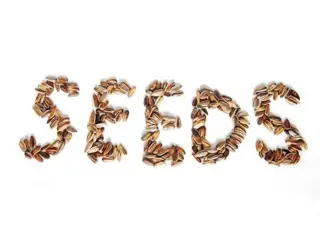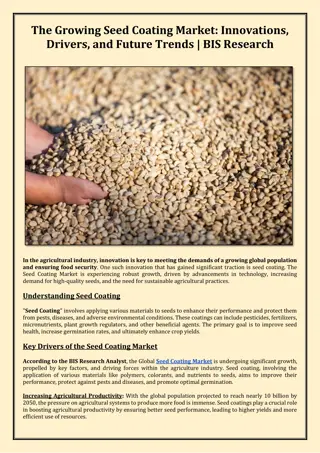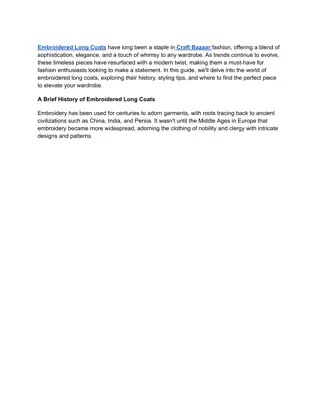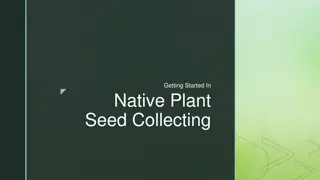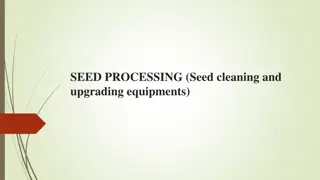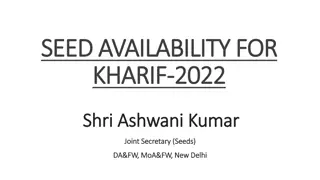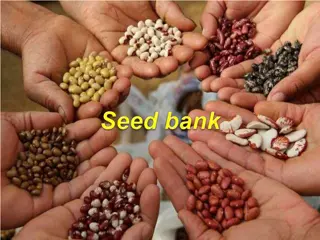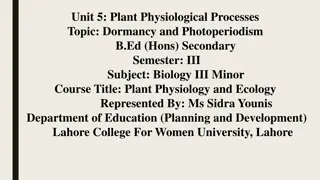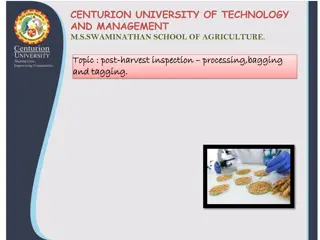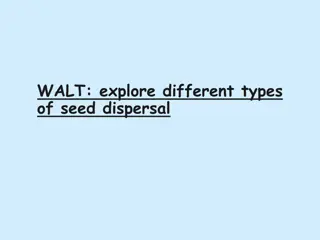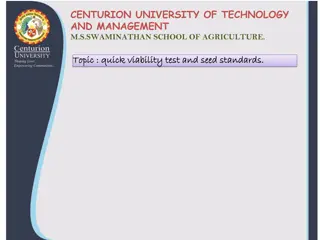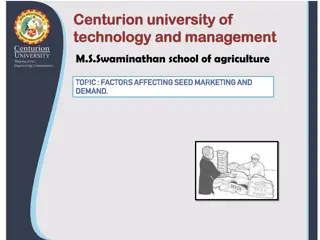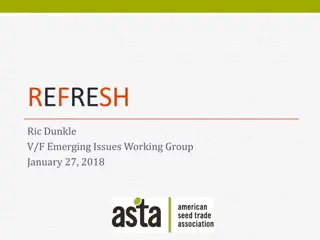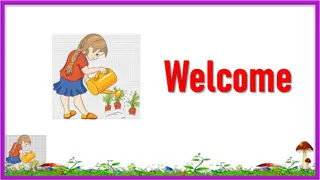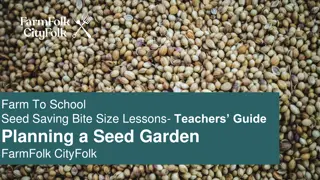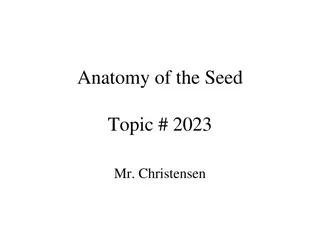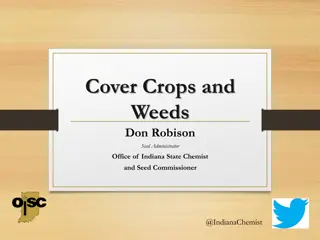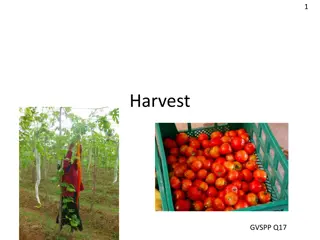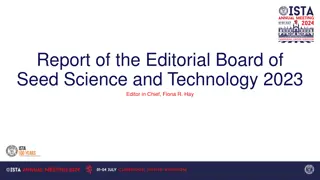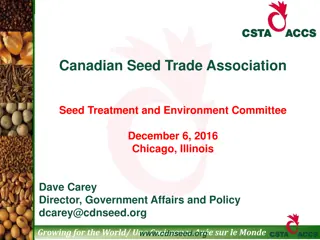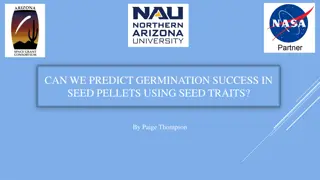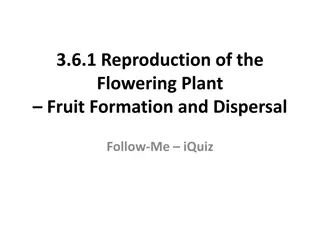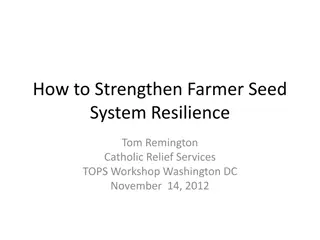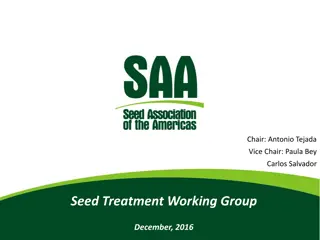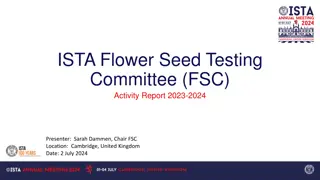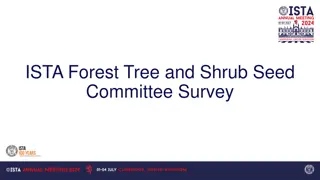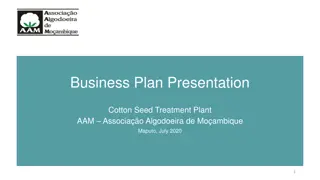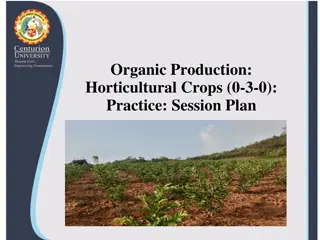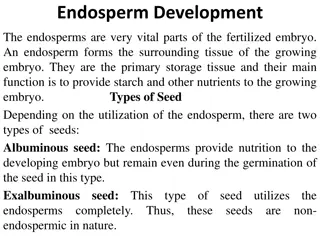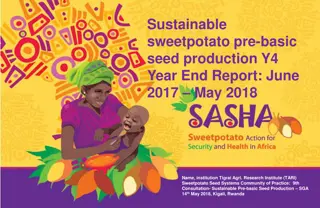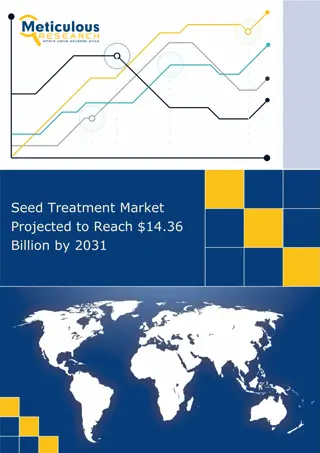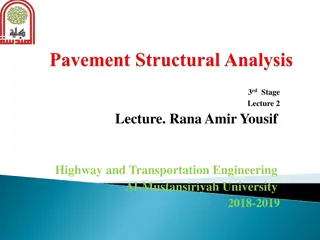The Fascinating World of Seeds: Shapes, Sizes, and Survival Strategies
Seeds come in a variety of shapes, sizes, colors, and textures. They have different ways of dispersal, such as through wind, animals, water, or even explosions. The seed coat plays a crucial role in protecting the seed. Understanding the diversity and survival strategies of seeds gives us insight in
5 views • 13 slides
Exploring Seed Plant Diversity and Adaptations
Delve into the realm of seed plants, uncovering their unique adaptations for reproduction, their phylogeny with gymnosperms and angiosperms, and the diversity within gymnosperms such as conifers, cycads, gingkophytes, and gnetophytes. Discover the evolutionary success of seed plants through their wa
5 views • 23 slides
Seed Treatment Market to Reach $14.36 Billion by 2031
Seed Treatment Market by Type (Chemical {Insecticides}, Biological), Form (Liquid, Dry), Function (Seed Protection, Seed Enhancement), Application Technique (Seed Coating, Seed Dressing), Crop Type (Cereals & Grains, Oilseeds) - Global Forecast to 2031\u2019
2 views • 5 slides
The Growing Seed Coating Market: Innovations, Drivers, and Future Trends
According to the BIS Research Analyst, the Global Seed Coating Market is undergoing significant growth, propelled by key factors, and driving forces within the agriculture industry. Seed coating, involving the application of various materials like polymers, colorants, and nutrients to seeds, aims to
0 views • 3 slides
Mastering the Trend_ The Embroidered Long Coat Guide
Mastering the Trend_ The Embroidered Long Coat Guide
3 views • 7 slides
Native Plant Seed Collection: A Guide to Conservation and Sustainability
Explore the valuable practice of collecting native plant seeds to preserve biodiversity, restore ecosystems, and promote sustainable land management. Learn about seed collection ethics, when to collect seeds, and seed germination methods for various species.
0 views • 15 slides
Efficient Layout Planning for Seed Processing Plant
Seed processing is crucial for removing contaminants and drying seeds to a safe moisture level. Planning a seed processing plant layout involves considering factors like types of seeds, operation size, equipment selection, location, labor availability, and more. Components of the building layout inc
1 views • 25 slides
Seed Availability for Kharif 2022 Overview
The data provides insight into the availability of certified/quality seeds for Kharif 2022 in various states/UTs of India. It includes figures on seed requirements, availability, deficits/surpluses, and the grand total for different regions. The information is essential for stakeholders in the agric
1 views • 15 slides
Understanding the Importance of Seed Banks in Ecosystems
Seed banks, categorized into soil and aerial types, serve as essential reservoirs for viable seeds and propagules. Soil seed banks are natural storage areas for seeds within ecosystems and play a crucial role in plant regeneration. They can persist for varying durations, influencing plant diversity
1 views • 16 slides
Understanding Seed Dormancy and Ways to Break it
Seed dormancy is a crucial aspect of plant growth, where seeds remain inactive and do not germinate even under favorable conditions. Various reasons contribute to seed dormancy, such as light, temperature, and hard seed coats. Different types of dormancy like innate, enforced, and induced are explai
0 views • 9 slides
Seed Post-Harvest Inspection and Processing Guidelines
The post-harvest inspection and processing of seed crops involve various crucial steps from pre-cleaning to seed treatment, bagging, and storage. Following specific prerequisites ensures the quality of the final seed lot. Inspection during processing and seed sorting in different crops is essential
1 views • 8 slides
Top Leather Trench Coat For Charming and Vigilant Look In 2024
The leather trench coats are aesthetically appealing. It gives you a charming overall look. Today, we are going to discuss the perfect leather trench coat. How can we style these trench coats, and how many variations are available in trench coat styl
0 views • 4 slides
Understanding Seed Dispersal in Flowering Plants
Explore the fascinating world of seed dispersal in flowering plants, from wind dispersal to bursting pods and shaking mechanisms. Discover the various methods plants use to spread their seeds and ensure their survival. Dive into the stages of a flowering plant's life cycle and learn how germination,
1 views • 16 slides
Understanding Seed Viability Testing and Standards
Seed viability is crucial for successful germination and plant growth. Various tests like tetrazolium, germination, cut, X-ray analysis, and more are used to assess seed viability. Preconditioning seeds, seed hydration, and seed staining are important steps in the tetrazolium test. Evaluating seeds
0 views • 8 slides
Factors Affecting Seed Marketing and Demand in Agriculture Sector
Factors affecting seed marketing include clear-cut policy, availability of adapted varieties, production and storage facilities, official programs, and demand forecasting. Components such as cropping patterns, climate, market situation, and farm income levels influence seed demand. Effective demand
5 views • 7 slides
Revolutionizing Seed Trade Regulations: The ReFreSH Approach
A new approach, ReFreSH, aims to enhance the efficiency of managing phytosanitary risks in international seed movements by shifting focus towards accrediting producers and production processes. This system seeks to accommodate all seed sectors and company sizes while promoting global adoption of bes
0 views • 20 slides
Advanced Treatment Processes for Faecal Sludge Management
Treatment processes for faecal sludge management involve various stages including preliminary treatment, primary treatment, secondary treatment, and tertiary treatment. Each stage employs mechanical, biological, and chemical processes to separate, decompose, and remove contaminants from the sludge,
0 views • 7 slides
Understanding Grow-Out Test for Genetic Purity Evaluation in Seed Certification
The Grow-Out Test is a crucial measure in seed certification to determine the genetic purity of seed lots. It helps in controlling genetic contaminations and ensuring compliance with prescribed standards. This test is essential for certain species like cotton, castor, musk melon, and brinjal in Indi
0 views • 16 slides
English Lesson: Rima and the Seed - Unit 15, Lesson 1
In this English lesson, young learners engage in activities involving a story about Rima and a seed. They review the previous lesson, listen to simple commands, understand questions, and enjoy stories. The lesson focuses on developing listening, speaking, and reading skills, such as recognizing Engl
0 views • 18 slides
Seed Saving and Garden Planning Resources for Schools and Educators
Discover a comprehensive guide on seed saving strategies, crop planting dates, and garden planning resources tailored for schools and educators. Explore seed-saving PDFs, recommended self-pollinating plants, helpful books, informative videos, and storage tips to enhance your gardening knowledge and
0 views • 7 slides
Understanding Seed Anatomy and Germination Processes
Explore the anatomy of seeds, including taxonomic classes like angiosperms and gymnosperms, subclasses within angiosperms, and components of a seed such as the embryo, endosperm, and seed coat. Learn about seed germination conditions, dormancy, and factors like favorable temperature and scarificatio
0 views • 17 slides
Vibrant Musicals: Young Voices, Andrew Lloyd Melody & Joseph's Coat
Explore the vibrant world of musical theater with "Young Voices 2015" showcasing talented performers, the enchanting melody of Andrew Lloyd, and the iconic story of Joseph's Coat. From Jacob and Sons in Canaan to Eva Peron's legacy in Argentina, immerse yourself in the colors and emotions of these t
0 views • 73 slides
Understanding Cover Crops and Weed Management
This detailed content provides insights into cover crop seed regulations, exceptions, and conditions. It also discusses weed seeds in cover crops, including issues with locally grown rye seed. Learn about the farmer exemption, weed species like rye, and seed sample terminology from an official persp
0 views • 17 slides
Harvesting and Postharvest Techniques for Quality Seed Production
Understand the importance of harvesting crops at the right timing to maximize seed quality. Learn about half-matured and full-matured stages, postharvest ripening, and indicators for precise timing. Discover the significance of counting days from flowering/pollination for determining harvest timing.
0 views • 24 slides
Understanding Family Coat of Arms in Heraldry
Explore the origins and significance of family coat of arms in heraldry, including the evolution of designs from shields to tunics, the role of heralds in battles, key terms like blazonry and charges, and common symbols used in heraldic designs. Delve into the fascinating world of heraldry with rich
0 views • 15 slides
Challenges and Innovations in Seed Science Publishing
Seed Science and Technology (SST) is an international journal focusing on seed quality and physiology. The journal, established in 1973, covers various aspects of seed production, testing, storage, and genetic conservation. Special issues like the 50th volume celebrate advancements in seed viability
0 views • 9 slides
Canadian Seed Trade Association Overview and Regulations
The Canadian Seed Trade Association (CSTA) plays a vital role in seed innovation and trade, focusing on open trade, increased investment in innovation, and industry-wide voice. The association follows specific regulations in Ontario related to neonicotinoids and pesticides. These regulations are dri
0 views • 26 slides
Enhancing Restoration Success with Seed Pellets: A Study on Predicting Germination in Arid Environments
Ecological restoration in arid lands often faces challenges with seeding projects. This study explores using seed pellets to predict germination success by matching seed traits with pellet characteristics. The hypotheses focus on seed size and species comparison to improve restoration practices.
0 views • 13 slides
Reproduction of Flowering Plants: Seed Development and Endospermic Seeds
The quiz content discusses the process of seed development in flowering plants, focusing on the formation and dispersal of fruits. It touches upon the different parts of a seed, such as the seed leaf, food store, ovule, and endosperm, highlighting their roles in the growth of new plants. Additionall
0 views • 50 slides
Strengthening Farmer Seed System Resilience Workshop Insights
Explore key insights from the TOPS workshop on strengthening farmer seed system resilience, focusing on seed security, resilience parameters, and the connection between shocks/stresses and farmer seed systems.
0 views • 22 slides
Seed Treatment Working Group Overview in the Americas
The Seed Treatment Working Group (STWG) in the Americas focuses on facilitating treated seed trade, promoting safe seed technology use, and collaborating with regulatory agencies. Activities include identifying regulatory agencies, educational materials translation, and regulatory mapping. Updates f
0 views • 14 slides
The LaPerm Cat: A Unique Feline Breed
The LaPerm cat is a distinctive breed known for its curly coat, originating from barn cats in Oregon in the 1980s due to a spontaneous mutation. It comes in both longhair and shorthair varieties, with all coat and eye colors accepted. This medium-sized cat has a modified wedge-shaped head, high chee
0 views • 22 slides
ISTA Flower Seed Testing Committee Activity Report 2023-2024
The ISTA Flower Seed Testing Committee, led by Sarah Dammen, presented their activities in 2023-2024 in Cambridge, UK. The committee discussed testing procedures for various flower species, initiated new projects, and worked on updating the ISTA Handbook on Flower Seed Testing. Proficiency tests, wo
0 views • 7 slides
Overview of Forest and Shrub Seed Testing Committee Activities
This document provides valuable insights into the activities of the ISTA Forest Tree and Shrub Seed Committee, including information on tested species, laboratory processes, and contributions to the seed trade. It outlines key questions posed to laboratories, details the most tested species, and hig
0 views • 17 slides
Enhancing Cotton Seed Quality for Sustainable Growth in Mozambique
The cotton subsector in Mozambique has significant potential but faces challenges due to the poor quality of seeds. AAM aims to improve cotton seed quality by establishing a seed treatment plant, benefiting farmers and ginners alike. The project, divided into inception and operational phases, promis
0 views • 59 slides
Organic Seed Treatment Techniques for Improved Horticultural Crop Production
Explore the benefits of organic seed treatment methods for horticultural crops, such as priming, pelleting, and seed health treatments. Learn how these techniques can enhance germination rates, protect against pathogens, and optimize planting accuracy in organic farming practices.
0 views • 14 slides
Understanding Endosperm Development in Plants
Endosperms are crucial for embryo development, providing nutrients and starch. There are two main types of seeds based on endosperm utilization: albuminous and exalbuminous. Endosperm development involves three types: nuclear, cellular, and helobial. Nuclear endosperms feature free-nuclear divisions
0 views • 6 slides
Sustainable Sweetpotato Pre-basic Seed Production Y4 Year-End Report
Tigrai Agri. Research Institute (TARI) presented a comprehensive report on the sustainable production of pre-basic sweetpotato seeds in Year 4, ending in May 2018. The report covers production capacities, targets vs. actuals, actions taken to increase multiplication rates and reduce production costs
0 views • 13 slides
Global Seed Treatment Market to Hit $14.36 Billion by 2031 Amid Growing Agricult
Seed Treatment Market by Type (Chemical {Insecticides}, Biological), Form (Liquid, Dry), Function (Seed Protection, Seed Enhancement), Application Technique (Seed Coating, Seed Dressing), Crop Type (Cereals & Grains, Oilseeds) - Global Forecast to 20
1 views • 4 slides
Understanding Typical Layers of Flexible Pavement in Highway Engineering
The typical layers of a conventional flexible pavement include seal coat, surface course, tack coat, binder course, prime coat, base course, sub-base course, compacted sub-grade, and natural sub-grade. Each layer serves a specific purpose in providing strength, durability, and drainage characteristi
0 views • 9 slides
